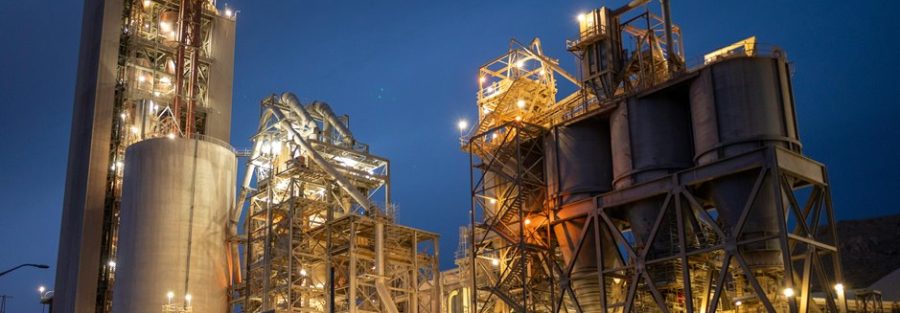At Novatia Consulting, we specialize in providing thorough feasibility study services for cement production in Nigeria. Our approach integrates detailed market analyses and financial evaluations to highlight opportunities and risks, ensuring project viability. We assess raw material sourcing and sustainability practices, conforming with regulatory standards and industry trends. Our data-driven methodology emphasizes stakeholder involvement for effective risk management and operational efficiency. By focusing on maximizing ROI, we deliver actionable insights that support informed decision-making. As you explore further, you'll uncover the nuances that can greatly impact your project's success and sustainability in this dynamic sector.
Key Takeaways
- Novatia Consulting specializes in conducting comprehensive feasibility studies tailored for the cement production sector in Nigeria.
- Their studies assess market viability, operational efficiency, and sustainability practices in cement production.
- The firm utilizes a data-driven approach to provide insights on investment returns and risk management.
- Novatia engages stakeholders to ensure collaboration and transparency throughout the project lifecycle.
- They offer strategic recommendations based on thorough market analysis and raw material assessments.
Importance of Feasibility Studies
When we're contemplating any significant investment, like cement production in Nigeria, understanding the significance of feasibility studies can't be overstated. These studies are essential for a thorough importance evaluation, providing us with the data necessary to assess the viability of our project. They play a pivotal role in decision making, impacting our strategic planning and shaping our approach to market entry.
By conducting thorough feasibility studies, we can guarantee investment justification, clearly demonstrating the potential returns and risks associated with the venture. This process goes beyond mere numbers; it fosters stakeholder involvement, ensuring all parties are coordinated and informed throughout the project lifecycle. Additionally, evaluating operational efficiency is a fundamental aspect of the study, which aids in identifying potential bottlenecks and optimizing processes for maximum productivity.
Furthermore, these studies help us measure project sustainability, allowing us to build a foundation for long-term success. By integrating all these elements, we can make informed decisions that improve our chances of success in the competitive cement market. Ultimately, feasibility studies are not just a preliminary step; they are a strategic tool that drives our investment forward with confidence.
Overview of Novatia Consulting
Understanding the importance of feasibility studies sets the stage for recognizing the value that Novatia Consulting brings to the table. Our firm specializes in providing extensive feasibility study services, particularly within the cement production sector in Nigeria. Leveraging Novatia expertise, we guide clients through complex project management processes, guaranteeing that their investments are strategically sound and in harmony with market realities.
Our approach centers on client collaboration; we work closely with stakeholders to understand their unique needs and objectives. By integrating industry trends into our analyses, we provide insights that go beyond traditional feasibility assessments. We guarantee that our clients are equipped with the data necessary for informed decision-making and strategic planning.
The consulting benefits we offer extend to risk mitigation, resource optimization, and timeline management, allowing our clients to maneuver challenges with confidence. As we analyze potential projects, we emphasize a data-driven methodology that improves outcomes and maximizes returns on investment. In a rapidly evolving market, Novatia Consulting stands out as a trusted partner, committed to delivering precision and clarity in every feasibility study we undertake.
Cement Market Analysis
Analyzing the cement market reveals significant trends and opportunities that can influence project viability in Nigeria. We observe a robust demand for cement driven by ongoing infrastructure projects and urbanization. This demand forecasting indicates a steady growth trajectory, suggesting that entering the market could be strategically advantageous.
By examining recent market trends, we can identify key factors affecting supply and pricing. For instance, the government's push for affordable housing and road development has created a favorable environment for cement producers. Additionally, fluctuations in international cement prices and local production capacities play an essential role in shaping our pricing strategy.
We should also consider the competitive landscape, as the presence of established players and new entrants can impact market dynamics. Understanding these elements allows us to position ourselves effectively and capitalize on emerging opportunities.
Raw Material Assessment
Securing the right raw materials is vital for guaranteeing the sustainability and profitability of our cement production venture in Nigeria. To achieve this, we need a robust strategy for raw material sourcing, which involves a thorough quality assessment of key materials like limestone, clay, and gypsum. Understanding local availability is significant; we must conduct geological surveys to identify potential sources near our production site, minimizing transportation logistics costs.
Moreover, a detailed cost analysis will help us assess not only traditional raw materials but also alternative materials that may offer advantages in quality or price. By staying attuned to market trends, we can adapt our sourcing strategies to guarantee we remain competitive.
Incorporating sustainability practices into our raw material sourcing will also be a priority, as it reflects our commitment to environmental responsibility. This means considering the environmental impact of our supply chain and exploring options for recycled materials. Ultimately, our success hinges on a strategic approach to raw material assessment, allowing us to optimize our operations and drive long-term profitability in the Nigerian cement market.
Regulatory Compliance Requirements
Maneuvering the regulatory landscape is a fundamental aspect of cement production in Nigeria, particularly following our raw material assessment. To guarantee our project's success, we must traverse complex licensing procedures and understand the various regulatory frameworks governing the industry. Compliance with industry standards isn't merely a formality; it's essential for maintaining operational integrity and gaining stakeholder trust.
We must conduct thorough compliance audits to identify any gaps in adherence to safety regulations and environmental regulations. This proactive approach not only reduces risks but also positions us favorably with regulatory bodies. Obtaining necessary production permits is critical, as it confirms our commitment to quality assurance and responsible production practices.
Moreover, we should stay informed about evolving regulations that may impact our operations. By fostering a culture of compliance, we can assure our processes correspond with both local and international standards. This strategic focus will improve our reputation and operational efficiency, ultimately leading to sustainable growth in the competitive cement market. To conclude, prioritizing regulatory compliance will be a cornerstone of our cement production venture in Nigeria.
Financial Viability Evaluation
Conducting a thorough financial viability evaluation is vital for our cement production project in Nigeria. We need to start with a detailed cost analysis, examining all expenses associated with production, including raw materials, labor, and overheads. This will form the backbone of our investment appraisal, allowing us to assess potential returns against our initial outlay.
Next, we should explore various funding options to support our project. Whether through equity financing, loans, or grants, understanding the implications of each option is significant. Alongside this, we'll develop profit projections based on current market trends and historical data, making sure our forecasts are realistic and attainable.
In addition to profit projections, we need to establish effective pricing strategies that reflect both production costs and market demand. By coordinating our prices with economic indicators, we can optimize our cash flow and guarantee sustainability in our operations.
Ultimately, this financial viability evaluation will provide us with a clear roadmap, helping us make informed decisions that correspond with our strategic goals and improve our competitive edge in the cement industry.
Environmental Impact Considerations
A thorough understanding of environmental impact considerations is crucial for the success of our cement production project in Nigeria. We must prioritize sustainability practices that minimize ecological footprints while maximizing operational efficiency. This involves analyzing resource extraction processes, energy consumption, and waste management strategies to guarantee they correspond with both local regulations and global standards.
One key area we must focus on is emission reduction. Cement production is inherently energy-intensive, contributing notably to greenhouse gas emissions. By adopting innovative technologies, such as alternative fuels and carbon capture methods, we can markedly lower our emissions. Additionally, embracing renewable energy sources, like solar or wind, will not only reduce our carbon footprint but also improve our long-term viability in a market increasingly focused on sustainability.
We should also involve local communities and stakeholders to understand their environmental concerns and incorporate their feedback into our practices. This collaborative approach will strengthen our commitment to responsible production while fostering goodwill and trust. Ultimately, by addressing these environmental considerations strategically, we can position our cement production project as a leader in sustainable development in Nigeria.
Risk Management Strategies
To guarantee our cement production project in Nigeria achieves its sustainability goals, we must implement extensive risk management strategies. This begins with rigorous risk identification, where we systematically analyze potential risks associated with production, supply chain disruptions, regulatory changes, and environmental impacts. By identifying these risks early, we can strategize effectively.
Once risks are identified, we'll develop detailed mitigation plans tailored to address each specific risk. These plans will not only outline preventive measures but also establish contingency protocols to minimize disruptions. For instance, in the event of supply chain delays, we'll explore alternative suppliers and stockpiling strategies to maintain uninterrupted production.
We should also prioritize stakeholder involvement, guaranteeing open lines of communication with local communities, government bodies, and industry partners. This collaboration will improve our understanding of potential risks and foster a supportive environment for our operations.
Lastly, continuous monitoring and reassessment of our risk landscape will be vital. As circumstances evolve, so must our strategies. By remaining proactive, we'll be well-equipped to maneuver uncertainties and guide our project toward success in Nigeria's competitive cement market.
Case Studies and Success Stories
In exploring the landscape of cement production in Nigeria, we can draw valuable insights from various case studies and success stories that clarify effective strategies and practices. One significant example involves a recent project where strategic stakeholder involvement played an essential role in adhering to project timelines. By actively involving local communities, regulatory bodies, and industry experts, we guaranteed alignment of interests and smoother project execution.
Additionally, we observed that firms implementing robust communication channels considerably improved their project outcomes. Regular updates and feedback loops kept all stakeholders informed, reducing misunderstandings and fostering a collaborative environment. This approach not only minimized delays but also improved trust among all parties involved.
Another successful case highlighted the importance of adaptive project management techniques. When unforeseen challenges arose, the teams promptly recalibrated their strategies, demonstrating agility without compromising on quality or safety standards.
These case studies underscore a vital lesson: integrating stakeholder involvement with strategic project management can lead to successful cement production initiatives in Nigeria. By learning from these examples, we can better steer through the complexities of our projects and drive sustainable growth in the cement industry.
Frequently Asked Questions
What Experience Does Novatia Consulting Have in Cement Industry Projects?
When considering experience in the cement industry, we analyze project management capabilities and adherence to industry regulations. Our expertise lies in maneuvering complex projects, ensuring compliance at every stage. We've successfully managed various initiatives, utilizing strategic planning and a thorough understanding of regulatory frameworks. By leveraging our knowledge, we can effectively address challenges and optimize project outcomes. Our team's collective experience positions us to deliver robust solutions tailored to the cement sector's demands.
How Long Does a Feasibility Study Typically Take to Complete?
A feasibility study typically takes several weeks to a few months to complete, depending on various duration factors. We need to take into account the project's complexity, data availability, and stakeholder involvement. For instance, if we're looking at extensive market analysis or regulatory assessments, it can extend project timelines considerably. By carefully planning and coordinating these elements, we can guarantee a thorough evaluation that meets strategic objectives while adhering to realistic timeframes.
What Are the Costs Associated With Conducting a Feasibility Study?
When considering the costs associated with conducting a feasibility study, we need to look at a detailed cost breakdown. Typically, expenses can include personnel, research materials, and data analysis tools, based on the study requirements. We should also consider potential travel costs and expert consultations. By strategically evaluating these factors, we can better manage our budget and guarantee the feasibility study provides valuable insights for our project's success.
Can Novatia Consulting Assist With Securing Funding for Projects?
When considering project viability, securing funding is essential. We can help steer through various funding strategies tailored to your project's needs. By leveraging our expertise, we analyze potential funding sources, ensuring harmony with your goals. Our team understands the complexities of financing, and we're committed to enhancing your project's attractiveness to investors. Together, we'll develop a robust approach to funding that maximizes your project's potential for success and sustainability.
Are There Any Specific Technologies Recommended for Cement Production in Nigeria?
When considering technologies for cement production in Nigeria, we should focus on sustainable practices that minimize environmental impact. Utilizing local materials not only reduces costs but also supports the community and local economy. Advanced methods like dry process kilns and alternative fuels can improve efficiency. We must assess these technologies strategically to guarantee they correspond with our sustainability goals, ultimately leading to a more responsible and cost-effective cement production approach.







